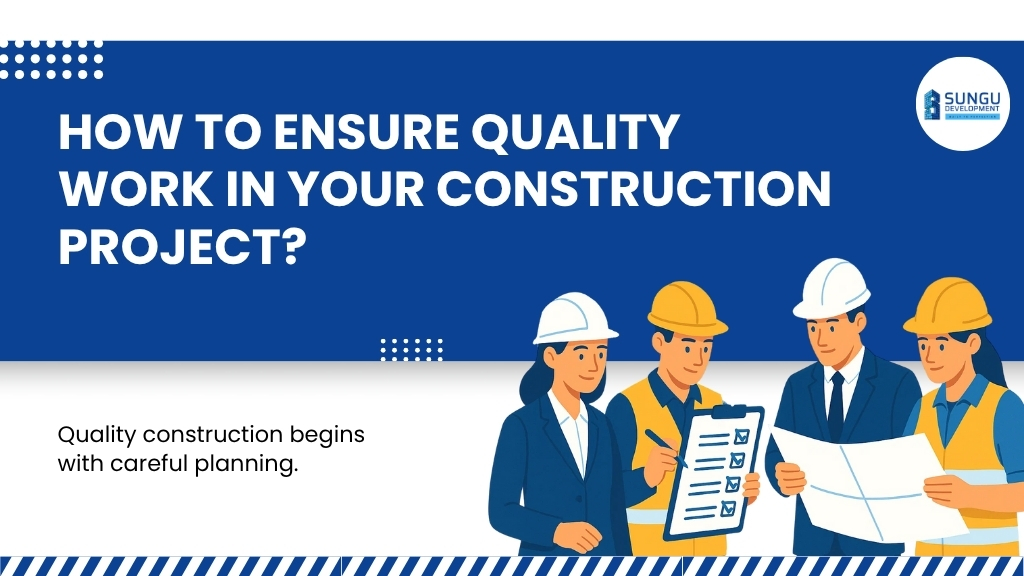
Ensuring quality work in a construction project is crucial to its success. From planning to execution, there are numerous factors that contribute to the overall quality of the finished product. Whether you are a contractor, project manager, or property owner, maintaining high standards of quality is essential to meeting deadlines, staying within budget, and achieving long-term durability. Here’s a comprehensive guide on how to ensure quality work throughout your construction project.
1. Establish Clear Project Specifications and Expectations
Before any work begins, it is essential to define the scope of the project, set clear expectations, and agree on the specific deliverables. This means:
- Creating detailed blueprints: Clear architectural and engineering plans should guide the construction process. These documents should highlight all specifications, including materials, dimensions, and design features.
- Setting quality standards: Specify the level of quality that is expected for each aspect of the project. This includes materials, finishes, and workmanship.
- Communication: Ensure all stakeholders, including architects, contractors, and clients, are aligned with the project’s goals and quality standards.
Clear specifications will serve as a reference for the entire team, ensuring that everyone understands the desired outcome.
2. Choose the Right Contractors and Skilled Workforce
The quality of the construction work largely depends on the skills and expertise of the team. Selecting the right contractors and workforce is paramount. Consider the following steps:
- Hire experienced contractors: Look for contractors who have a proven track record in handling similar projects. Check their references and past work to evaluate their quality.
- Specialized tradespeople: For specific tasks like plumbing, electrical, or carpentry, hire tradespeople with specialized expertise. Highly skilled professionals can ensure that these aspects of the project meet the required standards.
- Ongoing training: Provide your team with training on the latest construction techniques and safety protocols to enhance the quality of work.
3. Use High-Quality Materials
The materials you choose play a significant role in the overall quality and longevity of the project. Always select high-quality materials that meet or exceed industry standards. Consider:
- Researching material suppliers: Partner with reputable suppliers who provide certified and durable materials.
- Inspection of materials: Before using any material, inspect it for quality assurance. This will prevent the use of faulty or substandard materials in the construction process.
- Sustainability: If possible, choose eco-friendly and sustainable materials that contribute to a safer environment and a more durable structure.
Using superior materials can help reduce future repair and maintenance costs, ensuring a high-quality end product.
4. Implement Strict Quality Control Procedures
Regular monitoring and inspections throughout the construction process are key to ensuring that quality standards are met. Some steps include:
- Inspections at every stage: Conduct regular site inspections to assess the progress and quality of work. This includes checking the foundation, framing, and finishing stages.
- Hiring a quality control manager: A dedicated quality control (QC) manager ensures that all work complies with the specifications and quality standards. They are responsible for identifying potential issues and addressing them promptly.
- Test materials and systems: Before proceeding with certain stages, conduct material testing, such as concrete strength tests or system functionality checks, to verify that everything is up to standard.
Having a strong quality control process in place ensures that any discrepancies are addressed before they become major issues.
5. Maintain Strong Project Management
Effective project management is fundamental in maintaining quality throughout a construction project. A good project manager ensures that:
- The schedule is followed: Deadlines should be realistic, and progress should be regularly reviewed. Adhering to a strict schedule allows for the timely detection of potential problems.
- Budgeting: Staying within budget is often linked to maintaining quality, as cutting corners to save money may lead to compromised workmanship and materials.
- Clear communication: Regular updates and feedback loops between all parties involved (clients, contractors, suppliers) can help avoid misunderstandings and keep the project on track.
With proper oversight and effective management, the likelihood of achieving high-quality results increases.
6. Ensure Proper Documentation and Record-Keeping
Accurate documentation is vital for maintaining quality throughout the project. This includes:
- Contracts and agreements: Ensure that all agreements are documented, including the scope of work, timelines, and payment terms.
- Inspection and test reports: Keep detailed records of inspections, tests, and the results to provide transparency and accountability.
- Change orders: Document any changes in scope or specifications to ensure that any modifications are handled appropriately without affecting quality.
A well-maintained record-keeping system helps prevent miscommunications and ensures that everyone is on the same page throughout the project.
7. Foster a Culture of Quality Among the Team
Quality is not just the responsibility of the project manager or contractor; it’s a team effort. Foster a culture where quality is prioritized by:
- Incentivizing high standards: Recognize and reward workers for excellent performance and adherence to quality standards.
- Regular feedback: Provide constructive feedback to workers about their performance, ensuring that they understand the importance of quality work.
- Team involvement: Involve all workers in quality assurance practices, from daily briefings to team meetings where quality-related issues can be discussed.
Creating a quality-focused culture will motivate workers to take pride in their work and consistently deliver high standards.
8. Address Issues Promptly and Proactively
Despite best efforts, issues may arise during construction. It’s important to address them as soon as possible to prevent delays or quality compromises. Here’s how:
- Report problems immediately: If a problem is identified during an inspection, ensure it is reported immediately and rectified before moving on to the next phase of construction.
- Root cause analysis: For recurring issues, conduct a root cause analysis to understand why they are happening and how they can be prevented in the future.
- Effective communication: Communicate any changes or issues with the team clearly and promptly so that everyone is aware and can adjust accordingly.
Quickly addressing problems ensures that the project stays on track and maintains its quality.
Conclusion
Ensuring quality in construction requires a proactive and systematic approach. By setting clear expectations, hiring skilled professionals, using quality materials, and maintaining a robust project management framework, you can safeguard the quality of your construction project. Consistent communication, regular inspections, and a commitment to excellence at every stage of the process will help you deliver a high-quality final product. By following these steps, you can avoid costly mistakes and ensure that your construction project meets both your budgetary and quality goals.


